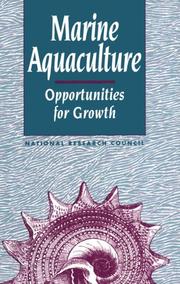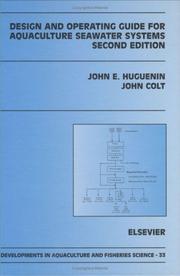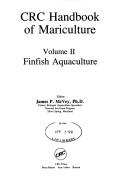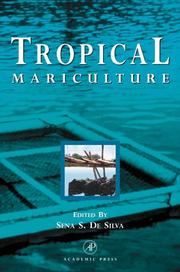| Listing 1 - 10 of 18 | << page >> |
Sort by
|

ISBN: 0309046750 9786610203420 1280203420 0309597870 0585026297 9780585026299 9780309046756 9781280203428 6610203423 9780309597876 Year: 1992 Publisher: Washington D.C. National Academy Press
Abstract | Keywords | Export | Availability | Bookmark
 Loading...
Loading...Choose an application
- Reference Manager
- EndNote
- RefWorks (Direct export to RefWorks)
Coastal farming and ocean ranching of marine fish, shellfish, crustaceans, and seaweed are a major and growing industry worldwide. In the United States, freshwater aquaculture is rapidly becoming a significant commercial activity; however, marine aquaculture has lagged behind. This book examines the obstacles to developing marine aquaculture in the United States and offers specific recommendations for technology and policy strategies to encourage this industry. The volume provides a wealth of information on the status of marine aquaculture--including comparisons between U.S. and foreign approaches to policy and technology and of the diverse species under culture.
Mariculture --- Government policy --- Farming, Marine --- Farming, Ocean --- Farming, Sea --- Marine aquaculture --- Marine farming --- Ocean farming --- Sea farming --- Aquaculture --- Biosaline resources --- Marine biology
Periodical
ISSN: 07483260 Publisher: Baton Rouge (La.) : Louisiana state university press,
Abstract | Keywords | Export | Availability | Bookmark
 Loading...
Loading...Choose an application
- Reference Manager
- EndNote
- RefWorks (Direct export to RefWorks)
Mariculture --- Mariculture. --- Farming, Marine --- Farming, Ocean --- Farming, Sea --- Marine aquaculture --- Marine farming --- Ocean farming --- Sea farming --- Aquaculture --- Biosaline resources --- Marine biology

ISBN: 1281057258 9786611057251 0080527531 0444505776 Year: 2002 Publisher: New York : Elsevier,
Abstract | Keywords | Export | Availability | Bookmark
 Loading...
Loading...Choose an application
- Reference Manager
- EndNote
- RefWorks (Direct export to RefWorks)
This book provides, in one place, basic information and considerations necessary to plan, build and operate seawater systems for culturing purposes. It provides design, construction and operations guidance for seawater (salinities from freshwater to brine) systems with flow rates of 10-1,000 gallons (40-4,000 liters) per minute. While the book concentrates on general circumstances, situations and concepts, comprehensive referencing of text and annotated bibliographies are provided in critical technical areas to allow readers to pursue specialized areas of interest. This upgraded and
Mariculture --- Public marine aquariums --- Equipment and supplies. --- Design and construction. --- Farming, Marine --- Farming, Ocean --- Farming, Sea --- Marine aquaculture --- Marine farming --- Ocean farming --- Sea farming --- Aquaculture --- Biosaline resources --- Marine biology --- Marine aquariums, Public --- Oceanariums --- Public aquariums --- Aquïcultura marina --- Aparells i accessoris

ISBN: 0849302196 Year: 1991 Volume: 2 Publisher: Boca Raton CRC
Abstract | Keywords | Export | Availability | Bookmark
 Loading...
Loading...Choose an application
- Reference Manager
- EndNote
- RefWorks (Direct export to RefWorks)
Fish culture --- Mariculture --- Pisciculture --- Fish-culture --- 639.3 --- Farming, Marine --- Farming, Ocean --- Farming, Sea --- Marine aquaculture --- Marine farming --- Ocean farming --- Sea farming --- Aquaculture --- Biosaline resources --- Marine biology --- Artificial propagation of fishes --- Culture, Fish --- Farming, Fish --- Fish aquaculture --- Fish farming --- Fish husbandry --- Fish rearing --- Fishes --- Rearing of fishes --- Animal culture --- Fish breeding. Pisciculture. Aquaculture --- Culture --- Farming --- Husbandry --- Rearing --- 639.3 Fish breeding. Pisciculture. Aquaculture
Periodical
ISSN: 21850194 03714217 Year: 1953 Publisher: Sendai-shi : Suisan Zōshoku Danwakai
Abstract | Keywords | Export | Availability | Bookmark
 Loading...
Loading...Choose an application
- Reference Manager
- EndNote
- RefWorks (Direct export to RefWorks)
Mariculture --- Fish culture --- Agriculture Sciences --- Fisheries and Aquaculture --- Artificial propagation of fishes --- Culture, Fish --- Farming, Fish --- Fish aquaculture --- Fish farming --- Fish husbandry --- Fish rearing --- Fishes --- Pisciculture --- Rearing of fishes --- Farming, Marine --- Farming, Ocean --- Farming, Sea --- Marine aquaculture --- Marine farming --- Ocean farming --- Sea farming --- Culture --- Farming --- Husbandry --- Rearing --- Animal culture --- Aquaculture --- Biosaline resources --- Marine biology --- Fish culture. --- Mariculture.

ISBN: 0122108450 9786611054151 1281054151 0080543308 9780122108457 9780080543307 9781281054159 Year: 1998 Publisher: San Diego, Calif. Academic Press
Abstract | Keywords | Export | Availability | Bookmark
 Loading...
Loading...Choose an application
- Reference Manager
- EndNote
- RefWorks (Direct export to RefWorks)
Tropical Mariculture takes an in-depth look at developmental activities in a growing industry striving towards sustainability and environmental integrity. All of the contributors to this book have considerable experience and expertise in the field of tropical mariculture, and this is the first book to bring expert contributions together. The topics covered are wide and varied, ranging from general issues such as the impact of mariculture on coastal ecosystems to genetic improvement of cultured marine species, as well as the specifics of breeding selected marine species of current importance, such as groupers and sea bass. Significant coverage is also given to the problems of larval rearing in inland aquaculture as well as the demands of water- and land-based resources in a tropical environment. This book will be essential for everyone working in and researching tropical mariculture.
Mariculture --- Zoology and Animal Sciences. Aquaculture and Fisheries --- Aquaculture and Fisheries (General). --- Marine biology --- Biological oceanography --- Ocean biology --- Oceanic biology --- Sea biology --- Aquatic biology --- Marine sciences --- Farming, Marine --- Farming, Ocean --- Farming, Sea --- Marine aquaculture --- Marine farming --- Ocean farming --- Sea farming --- Aquaculture --- Biosaline resources
Book
ISBN: 9789251063873 Year: 2009 Publisher: Rome FAO
Abstract | Keywords | Export | Availability | Bookmark
 Loading...
Loading...Choose an application
- Reference Manager
- EndNote
- RefWorks (Direct export to RefWorks)
While the concept and practice of integrated aquaculture is well-known in inland environments particularly in Asia, in the marine environment, it has been much less reported. However, in recent years the idea of integrated aquaculture has been often considered a mitigation approach against the excess nutrients/organic matter generated by intensive aquaculture activities particularly in marine waters. In this context, integrated multitrophic aquaculture (IMTA) has emerged, where multitrophic refers to the explicit incorporation of species from different trophic positions or nutritional levels in the same system. Integrated marine aquaculture can cover a diverse range of co-culture/ farming practices, including IMTA, and even more specialized forms of integration such as mangrove planting with aquaculture, called aquasilviculture. Integrated mariculture has many benefits, among which bioremediation is one of the most relevant, and yet is not valued in its real social and economic potential although the present document provides some initial economic estimates for the integration benefits derived from bioremediation. Reducing risks is also an advantage and profitable aspect of farming multiple species in marine environments (as in freshwaters): a diversified product portfolio increases the resilience of the operation, for instance when facing changing prices for one of the farmed species or the accidental catastrophic destruction of a crop. Yet such perspectives are far from being considered in mariculture where, on the contrary, there is a tendency to monoculture. Modern integrated mariculture systems must be developed in order to assist sustainable expansion of the sector in coastal and marine ecosystems thus responding to the global increase for seafood demand but with a new paradigm of more efficient food production systems. Successful integrated mariculture operations must consider all relevant stakeholders into its development plan government, industry, academia, the general public and non-governmental organizations must work together and the role of integrated mariculture within integrated coastal zone management plans must be clearly defined. There is a need to facilitate commercialization and promote effective legislation for the support and inclusion of integrated mariculture through adequate incentives particularly considering the reduction of environmental costs associated to monoculture farming. Bioremediation of fed aquaculture impacts through integrated aquaculture is a core benefit but the increase of production, more diverse and secure business, and larger profits should not be underestimated as additional advantages. In many cases, more research is needed to further integrated mariculture - particularly regarding the technical implementation of a farm. At this level, an important issue is to adopt adequate management practices that avoid or reduce the likelihood of disease transmission within and between aquaculture facilities or to the natural aquatic fauna. Also, careful consideration should be paid to the selection of species used in polyculture or integrated multitrophic aquaculture to reduce potential stress and suffering of culture individuals. Integrated aquaculture should be looked upon as a very important tool to facilitate the growth of marine aquaculture and promote sustainable development.
aquaculture. --- aquaculture --- Saltwater fishes --- Aquaculture techniques --- Tropical zones --- Mediterranean Sea --- Mariculture --- Sustainable aquaculture --- 639.32 --- Farming, Marine --- Farming, Ocean --- Farming, Sea --- Marine aquaculture --- Marine farming --- Ocean farming --- Sea farming --- Aquaculture --- Biosaline resources --- Marine biology --- Sustainable agriculture --- 639.32 Fish breeding in seawater and brackish water. Stocking of sea areas --- Fish breeding in seawater and brackish water. Stocking of sea areas --- Environmental aspects
Book
ISBN: 9789251060070 Year: 2008 Publisher: Rome FAO
Abstract | Keywords | Export | Availability | Bookmark
 Loading...
Loading...Choose an application
- Reference Manager
- EndNote
- RefWorks (Direct export to RefWorks)
Aquaculture in the Southeast Asian region has been growing steadily over the last few decades, requiring more space to accommodate it. The search for additional areas to expand the aquaculture industry as a whole and the identification of new farming species of commercial value to satisfy the growing local and export market are pushing the sector in some countries to broaden activities in the sea.--Publisher's description. Bangladesh; People's Republic of China; Hong Kong; India; Indonesia; Islamic Republic of Iran; Japan; Republic of Korea; Malaysia; The Philippines; Thailand; Viet Nam; Pacific Islands.
aquaculture. --- aquaculture --- Economic development --- Fishery production --- production factors --- production possibilities --- Environmental impact assessment --- Asia --- Mariculture --- 639.32 --- 639.32 Fish breeding in seawater and brackish water. Stocking of sea areas --- Fish breeding in seawater and brackish water. Stocking of sea areas --- Farming, Marine --- Farming, Ocean --- Farming, Sea --- Marine aquaculture --- Marine farming --- Ocean farming --- Sea farming --- Aquaculture --- Biosaline resources --- Marine biology --- Conferences - Meetings
Book
ISBN: 1613243707 9781613243701 1607415429 9781607415428 Year: 2010 Publisher: New York
Abstract | Keywords | Export | Availability | Bookmark
 Loading...
Loading...Choose an application
- Reference Manager
- EndNote
- RefWorks (Direct export to RefWorks)
Fishery policy --- Mariculture --- Marine ecology --- Marine mammals --- Aquatic mammals --- Marine animals --- Biological oceanography --- Marine ecosystems --- Ocean --- Aquatic ecology --- Farming, Marine --- Farming, Ocean --- Farming, Sea --- Marine aquaculture --- Marine farming --- Ocean farming --- Sea farming --- Aquaculture --- Biosaline resources --- Marine biology --- Government policy --- Research --- Protection --- Ecology
Book
ISBN: 9251075840 9789251075845 9789251073896 9251073899 Year: 2013 Volume: 549 Publisher: Rome
Abstract | Keywords | Export | Availability | Bookmark
 Loading...
Loading...Choose an application
- Reference Manager
- EndNote
- RefWorks (Direct export to RefWorks)
Mariculture. --- Sustainable fisheries. --- Fisheries productivity, Maintenance of long-term --- Fishery yields, Sustainable --- Long-term fisheries productivity, Maintenance of --- Maintenance of long-term fisheries productivity --- Sustainable fishery yields --- Fisheries --- Sustainable aquaculture --- Overfishing --- Farming, Marine --- Farming, Ocean --- Farming, Sea --- Marine aquaculture --- Marine farming --- Ocean farming --- Sea farming --- Aquaculture --- Biosaline resources --- Marine biology
| Listing 1 - 10 of 18 | << page >> |
Sort by
|

 Search
Search Feedback
Feedback About UniCat
About UniCat  Help
Help News
News